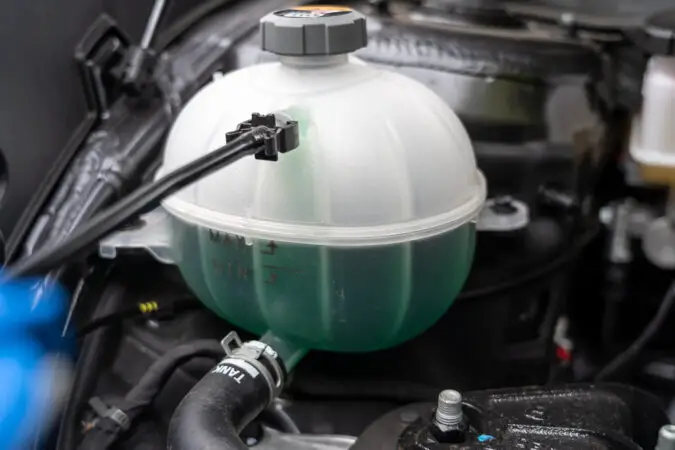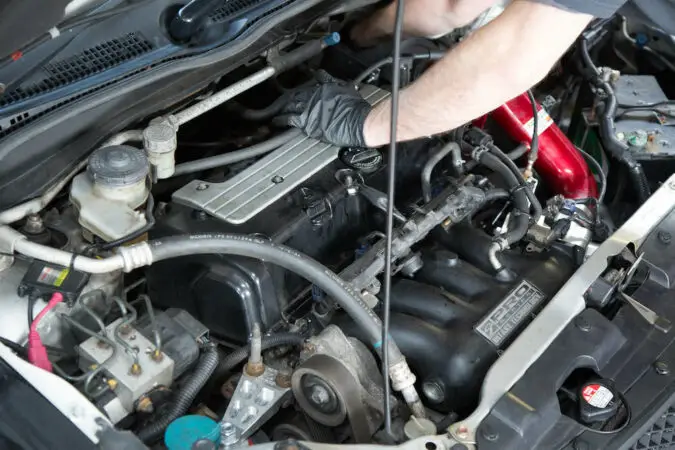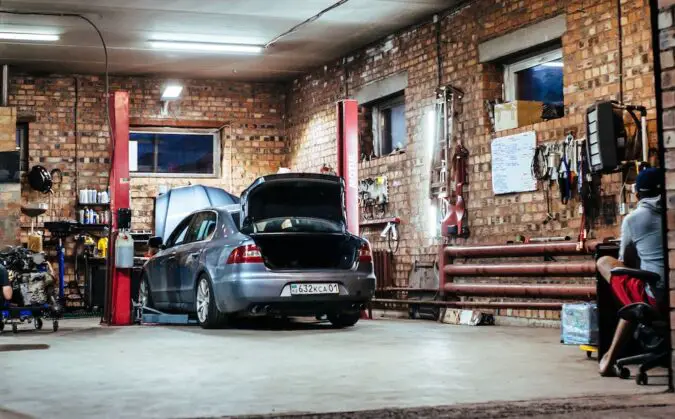Is your car overheating lately and you are asking yourself, what are the car overheating causes? Why does this happen in the first place? If this is the case, then you are at the right place because there will be a lot to cover on this topic where we will learn everything when it comes to car overheating causes.
Having the ability to diagnose problems like this can be a critical thing sometimes, like life and death criticality. Why I’m saying this? Well, I’m saying this because car overheating is one of the things you don’t want to experience as a car owner.
When a car overheats, nothing good happens. The engine is basically very ill and does not perform as it should as well as cause a lot of trouble for you as a car owner when it comes to fixing the problem. And trust me, sometimes fixing this problem can cost thousands of dollars if you are very unlucky. The longer the car overheats, the worse for you as a car owner because the repair bill will go through the roof. But more on that later in the article.
First, we are going to elaborate on the problem with overheating. Then we will learn how the cooling system works and the symptoms of a car that is overheated. Then we will learn the car overheating causes. After this, we will dive into diagnosing the problem and fixing the issue. So, if you want to learn more, follow along till the end.
Car Overheating? What’s The Problem?
Now before we dive into the car overheating causes let’s cover some of the basics and that is a bit on the problem itself. What is overheating and why does it happen? If you are feeling that you are well prepared, you can move on to the causes, if not, keep up with us. Now let’s elaborate on the problem.
The car overheating problem is basically whenever the engine is going over the factory recommended temperatures. Meaning that the coolant level is basically going into the red zone and is close to the boiling point.
And your engine will not like this at all. The engine is most happy when it is working on the factory temperatures and everything higher and lower than that will result in poor engine work.
Whenever the car is overheating, the coolant will start to boil and there will be a frequent release of pressure from the coolant expansion tank that is located in the engine bay. This tank has a valve to release this pressure whenever there is too much of it. But sometimes whenever the overheating is too much this valve will not be able to manage this.
So, the next thing that could fail is the head gasket or some of your radiator hoses. That’s why tracking the temperatures is very essential. If you notice a slight overheat you need to react and make sure that you sort the issue as soon as possible. But more on that later.
In the following chapter, we are going to cover how the cooling system works, for beginners to catch up and learn the basics of this system. This is crucial when it comes to understanding the car overheating causes that we will discuss later on.
How Does The Cooling System Works?
Now before we dive deeper into the symptoms and the car overheating causes, let’s first learn how the cooling system works in a car. This will be quite handy to learn and understand what are the breaking points that often happen when there is major overheating in the engine. So, if you want to learn more about this, keep up with us.
The cooling system on each internal combustion vehicle is an enclosed circulating system that circulates the coolant inside and outside of the engine. But what makes all this possible?
All this is possible by a component that is located on the periphery of the engine. This component is the water pump. The water pump for car is driven by the drive belt also known as the serpentine belt. This belt spins the water pump and moves the coolant inside and outside of the engine block.
But what allows the coolant to escape the block is the thermostat who opens whenever the operating temperature has reached the limit.
Then this thermostat opens as we mentioned and the coolant goes in the radiator hose and enters the radiator. There the coolant is cooled down with the help of the air drag. And then again is pushed into the engine after the cooling process is completed.
Overall a really simple system that hasn’t changed much since the early days when cars were first introduced. But it kept being more and more refined throughout the years with improved radiators and better quality coolants and other components that improved its performance by a big margin.
Even though, cars still tend to overheat and cause overheating symptoms that we are going to cover next. And after the symptoms, we will cover the car overheating causes.
Car Overheating Causes That Lead To Symptoms
Now before we dive into the car overheating causes, let’s first cover the car overheating symptoms. The symptoms are also quite essential for people to recognize whenever their car is overheating.
As with every problem, similarly when the car is overheating it starts to develop symptoms. Some of them are very obvious and are a tell-tell sign that the car is overheating, while some of them are hidden and you will not notice them if you don’t open the hood. So, what are these car overheating symptoms? Let’s elaborate in the following chapters. After that, we will cover the car overheating causes.
1. Temperature Gauge Rising
Now before we dive into the car overheating causes, let’s cover some of the symptoms of overheating.
And the first symptom of your car overheating would probably be the temperature gauge rising on your dash.
Usually, the temperature gauge starts in the blue zone, and then it moves up in the middle of the gauge when the engine is at the operating temperature. But if the gauge has reached the operating temperature and the gauge goes into the red zone, it means that there is a problem with the cooling of your engine.
Meaning that your car is overheating and some unknown car overheating causes are making your car overheat. In this scenario, it is often advised not to drive your car for a longer period of time. Make sure that the engine is properly cooled down.
If you plan to travel on a long trip you should cancel this trip. I’m saying this because you might face some overheating issues on the way. So, beware of the temperature gauge and the temperature warnings that will pop up on the cluster. If there are warnings move on to the car overheating causes that we will cover next.
2. Low Coolant Level
Another symptom that we will cover before we dive into the car overheating causes is the low coolant level.
Usually, when a car overheats, the coolant level in the expansion tank is low or completely empty. For this symptom, you will also receive some warning lights on the dash about how the coolant level is getting low and will ask you to top off the coolant.
When you open up the hood, the tank will be empty or below the minimum level.
Note: Don’t open the cap when the car is warmed up. You risk coolant splashing you and causing heavy skin burns.
Top off the coolant when the car is cold and there is no pressure in the system. This way, you will be sure that you will not burn yourself. Safety is the number one priority.
Now before we cover the car overheating causes, let’s discuss the last symptom of overheating engine.
3. Poor Engine Performance
And the last of the symptoms that we are going to cover before we dive into the car overheating causes is poor engine performance. Yep, that’s right, your engine will not be happy when overheated.
Your performance will suffer greatly when the engine overheats. The engine will simply lose a ton of power and will eventually stall.
As you know, the engine needs to be at operating temperature to work right. If the temperature is too high or too low, the engine will not like this and you will lose performance. In the worst cases, you will have to stop and wait for the engine to cool off before you continue driving. That’s why you should learn the car overheating causes to diagnose this problem quickly. And that’s what we will cover next.
Car Overheating Causes
Now we came to the important bit and that is the car overheating causes. By learning the symptoms you probably have made the conclusion that the car is overheating.
If this is the case and the car really overheats. Then you need to move on to learning the car overheating causes. What causes the car to overheat and cause you this trouble in the first place? But you shouldn’t worry because in the following chapters we are going to cover precisely that.
1. Bad Thermostat
Now let’s cover the first in our list of car overheating causes and that is a bad thermostat. As you probably know the thermostat is one of the most important components of the internal combustion engine.
This small device is installed on the engine block. And has a simple purpose which is to open the cooling system and allow the flow of coolant from the engine into the front radiator. This normally happens when the engine reaches the operating temperature.
But unfortunately, this thermostat often tends to fail and not open. And what happens in this situation is the coolant starts to boil inside of the engine. Causing the engine to overheat. So, the thermostat is one of the first components that you will need to address when it comes to diagnosing the problem. Now let’s move to the next car overheating causes.
2. Bad Radiator Fans
The second in our list of car overheating causes is the problem with the radiator fans. As you know the radiator has fans that kick in to cool it off unless there is not enough drag from the air so the engine will not overheat.
Sometimes these fans can malfunction and cause problems like this one with the overheating. The fan is not working to cool off the coolant and the engine overheats as a consequence. Checking them is the right way to go. Now let’s move to the other car overheating causes.
3. Broken Water Pump
Another in our list of car overheating issues is the broken water pump. As we learned in the chapter on how this cooling system works, the water pump plays an integral role when it comes to running the coolant in and out of the engine.
Sadly though, these water pumps have a limited lifespan of about 60,000 miles. They can last even more in some cases. But it is recommended for them to be replaced at this mileage. If the water pump is not replaced on time, it could break and the engine will overheat. Now let’s move to the other car overheating causes.
4. Damaged Or Clogged Radiator
Another in our list of car overheating causes is the damaged or clogged radiator. As you know the radiator is the component that sits in front of the car behind the bumper and this radiator aids the cooling of the coolant.
Sometimes, this radiator can fail and start to leak. You will constantly lose coolant and the car will be left bone dry and overheat. Another way a radiator can fail is if the radiator has too much corrosion in it. The coolant will not flow well in this radiator. And this low flowing radiator will not meet its target to cool off the engine. Now let’s move to the next car overheating causes.
5. Coolant Leaking
When we discuss car overheating causes we cannot avoid the coolant leaking issue. The coolant leaks and basically the car is running with low coolant.
This leak can be attributed to a bad radiator, bad coolant hoses, or a blown head gasket. The coolant will leak and evaporate. The more coolant burns and evaporates, the worst the problems are. The car will overheat and develop issues with the work of the engine and will eventually stall as we mentioned previously.
So, it is often advised for you to inspect the coolant level and top off the coolant whenever there is a need to do so. Now let’s move to the next car overheating causes.
6. Air In The System
When we discuss the car overheating causes we cannot ignore the air in the cooling system. This is most common on cars that are losing coolant all the time for some reason.
The cooling system has to be pressurized. Whenever there is a leak in the system, the system will allow air to get into it. This will make the car lose pressure and overheat in the process because the engine will be full of hot air instead of coolant and the transfer of coolant in the system will be close to impossible.
So, you see the necessity to address leaks whenever they appear. If you let your coolant leak, the system will completely malfunction and cause a ton of issues. Now let’s move to the other car overheating causes.
7. Blown Head Gasket
And the last in our list of car overheating causes is the blown head gasket. As we all know this is the gasket that lies between the head and the engine block. And is only role is to prevent the coolant from mixing with the oil and also prevent the coolant to enter the combustion chamber.
Sadly though, the head gasket can fail and it can happen more often if the car was driven hard. This will apply huge pressure on the gasket and will burn the material.
Whenever the gasket fails, it will allow the coolant to seep into the combustion process or even outside of the block in some cases and little by little, you will start to lose the coolant on your car. The more coolant you lose, the more symptoms the car will develop and will eventually overheat. Stalling the engine in the process.
As we have covered the car overheating causes, we can move on to the diagnosing process and find out more about how you can troubleshoot the issue.
How To Diagnose Overheating Issue?
Now after we covered the car overheating causes, let’s discuss the diagnosing process. How you can diagnose where your car overheating comes from?
For this, you will need to put up your sleeves and start troubleshooting stuff. The first thing you will need to do is to turn on your flashlight and try to locate leaks.
You need to inspect all of the cooling hoses and the radiator. You basically need to check every component of your cooling system to determine from where the coolant is lost and then to determine a possible reason for the overheating.
If everything is good with the cooling system and no coolant is lost the next thing you would want to check is the radiator fans and the thermostat. These components are crucial when it comes to the work of the cooling system.
It is often advised to replace the thermostat as a precaution and see where this takes you. Also, you will need to troubleshoot the fans and see if they kick in.
You will also need to see if the water pump is working well. The water pump is crucial when it comes to circulating the coolant and is one of the most common car overheating causes.
And when it comes to car overheating causes, the last thing you want to check is the head gasket. If nothing works and your car is losing the coolant, then the head gasket is the prime suspect. In addition to this, the heater core and heater core hoses need to be inspected if you are losing coolant as well.
There are a ton of car overheating causes and they all need to be properly troubleshot so the root of the problem be determined.
How To Fix Car Overheating?
After we covered the car overheating causes, now let’s discuss the fixing process of this problem. And fixing this issue greatly depends on what is causing this problem in the first place.
Meaning that the solution to this problem can be a simple coolant hose clamp. And as complicated as doing a complete engine overhaul and replacing the head gasket.
That’s why it is really worth doing proper troubleshooting and determining the right car overheating causes for a successful repair to be done to the car. The important thing is to never leave your car out of coolant and always top off the coolant. Normally, this is done when the car is cooled off. So, beware of this. Now let’s move to the cost.
Cost To Fix Overheated Car Causes
So, we covered the car overheating causes, now let’s discuss the cost to fix an overheated car. How much you can expect to pay?
Well, if you catch this problem in the early stages and you sort out the problem quickly, you can escape with only a thermostat if this is the problem. A part that is $50. Or a coolant hose that costs $30. Radiators are also cheap and cost about $150.
But if this problem is caused by a water pump, you can expect to pay about $300. Another expensive fix is installing a new head gasket. The head gasket is cheap and costs about $30 or $50. But what is expensive is the labor. And the labor can cost even up to $1,200.
This is because the engine head has to be resurfaced and machined. All this adds up pretty quickly. That’s why don’t run your car if it starts to overheat. The more you run it, the more damage you create.
Car Overheating: Facts You Need to Know
- Car overheating is a serious issue that can cause severe damage to the engine if not addressed immediately.
- The cooling system is responsible for regulating the temperature of the engine and consists of several components such as the radiator, thermostat, and water pump.
- Low coolant, faulty radiator fans, broken serpentine belt, or a stuck thermostat are common causes of car overheating.
- The first step in troubleshooting an overheating condition is to check the coolant level and radiator cap for any damage or corrosion.
- Air bubbles in the system can cause the coolant to not circulate properly, so it is essential to “burp” the system to remove any trapped air.
- The radiator fans should spin when the car is approaching operating temperature. If they don’t, the issue may be the fan motor or relay that controls it.
- A broken serpentine belt can cause the water pump to stop turning, leading to an overheating condition.
- Small leaks can be just as problematic as major leaks and can be difficult to detect. Look for greenish residue around the hoses.
- A stuck thermostat can cause the coolant to not circulate properly, leading to overheating. To test a thermostat, you will need boiling water.
- If none of the above steps solve the overheating condition, the cause may be a more serious issue such as a bad water pump or a blown head gasket, which would require professional repair.
Conclusion To Car Overheating Causes
In this article, we have covered quite a bit about the car overheating causes. Firstly, we elaborated on the problem with the overheating that often can happen in our cars. Then we learned how the cooling system works to make you understand what could be the possible reasons for overheating.
Then we learned the symptoms that you will notice when the car overheats as well as the car overheating causes. After we covered how you can diagnose and fix the issue based on the cause and also at what price this will be possible.






